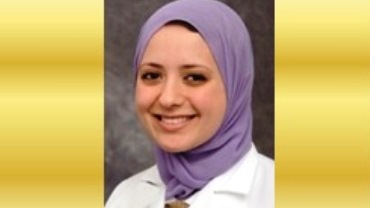
A non-invasive seizure detection system in which sounds can be used to alert caregivers and loved ones that a patient is having a seizure could come to market in the future if neurologist Maysaa Basha, M.D., can win over the judges in a "Shark Tank"-style competition this month.
"Currently, the seizure detection tools on the market for patient use have high false positives or low sensitivity. We feel our system, either on its own, or in combination with other tools, can improve the technology, which will help keep patients safe," she said.
Dr. Basha, an associate professor of Neurology at the Wayne State University School of Medicine and a neurologist at the WSU Adult Epilepsy Comprehensive Center, is one of the top six finalists in the Epilepsy Therapy Project's sixth annual Shark Tank Competition, named after the "Shark Tank" program on ABC television that allows entrepreneurs and inventors to pitch their ideas to industry investors.
She is the principal investigator on the project, "The Sound of Seizures: Audio-triggered seizure detection," which proposes a method of identifying and capturing seizure-specific sounds such as ictal cries or grunting in a monitoring unit. The goal is to reduce the risk for respiratory distress, physical injury or sudden death in epilepsy patients who experience frequent generalized tonic-clonic seizures.
Ming Dong, Ph.D., associate professor of Computer Science in the WSU College of Engineering, is the co-principal investigator on the project.
Dr. Basha will present the product concept at the 2017 Antiepileptic Drug and Device Trials Conference, scheduled for May 17-19 in Aventura, Fla.
Finalists receive a minimum award of $5,000. Winners of the competition, an Epilepsy Foundation initiative, will receive awards totaling $200,000 to support the development and commercialization of the new product, technology or therapeutic concept to help people with epilepsy.
A proprietary signal-processing software can be used to create an electronic signature for each sound type, which can be embedded into a smartphone app that triggers a notification when a seizure occurs to alert caregivers.
"The alarm system can alert caregivers to provide early care to the patients, limit injuries, and limit confusion and wandering that can occur after a seizure," she said. "I feel like it can help with independence to the patient and peace of mind to the caregiver or relative. I see many college students with epilepsy or adults who are ready to live on their own. These patients are often accompanied by moms who still get up every night to go to their adult child's room and make sure they are OK, so it becomes a difficult situation. The same is true at the other end of the spectrum, with an elderly patient who still wants to live on his or her own, but their relatives are concerned about undetected or unknown seizures."
The winning entry will be selected through live voting by conference attendees and a panel of judges representing physicians and scientists, corporate executives, leading industry investors, people with epilepsy and advocates.
"We feel this is a good opportunity to move the project forward," Dr. Basha said. "I'm very impressed with the resources we have at Wayne State, especially at the Division of Research and the Technology Commercialization team."